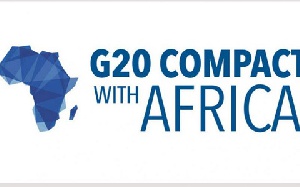 The CWA seeks to support African Compact countries to improve their performance
The CWA seeks to support African Compact countries to improve their performance
Strong leadership, macro-economic stability, adequate infrastructure, entrepreneurial skills, tax reforms and African ownership of the Compact with Africa process were issues high on the agenda of Finance Ministers attending the first G-20 Compact with Africa meeting in Accra, Ghana, yesterday.
The meeting, convened by Ghana’s Finance Minister, Ken Ofori-Atta, with technical support from the African Center for Economic Transformation (ACET), provided a platform for the finance ministers to discuss what role the G-20 Compact could play in the collective economic transformation agendas of Africa, as well as how to overcome challenges in its implementation.
The CWA seeks to support African Compact countries to improve their performance under three pillars – macroeconomic, business and financial – to attract private investment and strengthen their public sector financial and debt management.
Seven African countries namely, Côte d’Ivoire, Ghana, Ethiopia, Morocco, Rwanda, Senegal, and Tunisia have signed on to the Compact. Although Ethiopia and Tunisia did not attend the meeting, other countries represented as observers at the meeting were Burkina Faso, Benin, Gambia and Guinea.
Ghana’s Vice President H.E. Dr. Mahamudu Bawumia, in his welcome address, said the CWA presents an opportunity to re-focus attention on areas of investments in Ghana. “For Ghana, the CWA has been an opportunity to re-focus our attention on areas where investment is badly needed, and where we have created a positive business environment,” Dr. Bawumia said. “This includes areas such as renewable energy, agriculture and agro-processing, the financial sector, infrastructure, manufacturing and tourism sectors,” the Ghanaian Vice President continued.
He gave examples of work under the CWA pillars. “Under the macroeconomic framework pillar of CWA, we are focused on constraining expenditures to reduce expenditure overruns and pursuing domestic debt re-profiling to lengthen maturities and the cost of credit. Under the business framework pillar, we are creating the Ghana Business e-Registry and developing model contracts in line with international best practice,” the Vice President said.
Ghana’s Finance Minister, Hon. Ken Ofori-Atta, emphasised the need for private investment in infrastructure and the manufacturing industries to add value to agriculture and create jobs. “Africa needs to spend about US$340 billion on infrastructure by 2040 to drive investment to the continent,” the Finance Minister said, quoting the African Development Bank.
He stressed the importance of African ownership of the CWA but noted that the CWA’s focus on better fiscal management and increasing private sector investment fully meshes with Africa’s agenda.
Minister Ofori-Atta noted moreover that the CWA offers a framework through which the Compact countries can work together through peer learning and mutual motivation to accelerate growth on the continent.
In closed sessions, finance ministers and representatives of Compact and observer countries took turns to explain aspects of their national economies for which the Compact could be useful, challenges to implementation of the Compact and solutions to the challenges.
Discussions also underscored the need to widen the tax base to include the informal sector as a source of domestic resource mobilization in an era of declining aid financing. Economic growth that impacted positively on the lives of people in the area of poverty reduction and social inclusion, regional integration, efficient communications, diversification of economies and strong tax regimes were identified as key interventions to attract private investment. A peer-review mechanism among CWA countries was seen as key to promoting mutual accountability and peer learning, and ACET was asked to assist in developing such a platform.
Development partners including the World Bank, the International Monetary Fund (IMF), the AfDB and the African Capacity Building Foundation (ACBF) also committed their support to assisting the seven countries to achieve the objectives of the Compact. The German Ambassador to Ghana thanked the Government for its commitment and leadership in the CWA process. The meeting concluded with strong commitment and a clear way forward on implementing the CWA amid rising expectations by African countries, development partners and G20 governments, and the adoption of a consensus document for the successful implementation of the Compact.